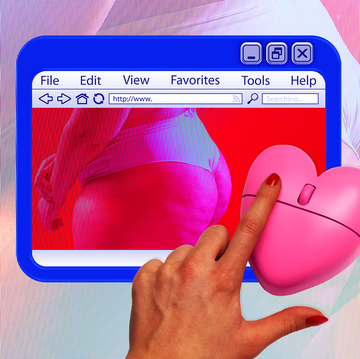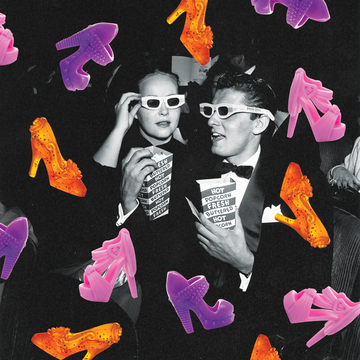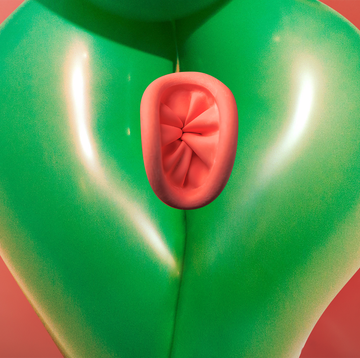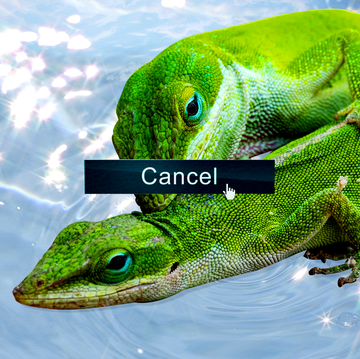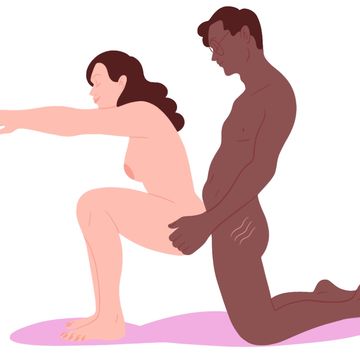Look, sometimes we want to have more sex and experience more desire, but it just doesn’t feel like that’s in the cards. It happens to the vast majority of people at different points in their lives, so if it’s happening to *you*, don’t sweat it. Libido is far from a simple beast, friends. The ability to experience sexual desire is born out of complex physiological, biological, and social factors, which means that figuring out how to increase your sex drive can be, well, equally complex. Nevertheless, we shall persist!
First things first: It’s important to keep in mind that physical arousal, libido, and desire can be related, but are not all the same things. Desire is our interest in sexual activity, whereas sexual arousal is the physiological state of being sexually turned on—aka when your vagina gets wet and your clitoris and surrounding tissues become engorged. Libido, meanwhile, is, well, horniness.
When we say “sex drive” we’re really referring to libido. “Sexual desire is not confined to biological instincts. It is an amalgamation of psychological, emotional, and relational elements, coupled with our unique experiences and cultural contexts, says Nazanin Moali, PhD, an AASECT-certified psychologist, educator, and podcaster. This means that a variety of factors can affect how often and how intensely we experience desire, including our life circumstances, stress levels, and a whole bunch of other stuff. Understanding how libido actually functions and determining the specific contexts in which your desire for sex is able to emerge is key to increasing it.
More From Cosmopolitan

We should also mention that “horniness” is not always the reason people seek out sex, nor is it the only valid one. We may want it because we want more closeness with our partner, to maintain an intimate connection, or just to have the release of orgasm after a stressful day. And according to sex therapist Cyndi Darnell, author of Sex When You Don’t Feel Like It: The Truth about Mismatched Libido & Rediscovering Desire, these are all perfectly good reasons to want to have sex, JFYI.
Now, with all that being said, let’s break down how to set the stage for an increased libido, and, more importantly, a better and more fulfilling sex life.
Hi, so “sex drive” is actually a misnomer...
...And understanding this is crucial to increasing libido. Here’s why. “Drive” implies that sex is an innate human “need,” like in the same way we need oxygen, sleep, and food. You will not die without having orgasms and sex. Can it sometimes feel like you just might perish if you don’t come? Sure. But you won’t.
“This doesn't devalue the importance of our sexual urges, but demonstrates that they are more complex than what the term ‘drive’ typically implies,” says Moali.
Our libido (horniness) and desire for sex is actually rooted in a reward system. “We [are] motivated to seek sex for the rewards it provides us (e.g., closeness to a partner, [or] an orgasm),” explains certified sex therapist Laurie Mintz, PhD, author of Becoming Cliterate.
8 things that negatively impact libido
Before we get into the things you can do to boost your sexual desire, let’s first chat about some libido-busters that may be putting a damper on it.
1. Incorrect messages about sex
Sorry to drop the P-word, folks, but it’s our old friend the patriarchy again. Darnell notes that a lot of the messages we (women, in particular) tend to absorb and internalize about sex can seriously hamper our ability to actually enjoy and desire it. Think: sexist, heteronormative nonsense that encourages women to prioritize men’s pleasure and centers penetrative, goal-oriented intercourse ending in (again, usually male) orgasm as the ultimate raison d’être of any sexual encounter. Thanks bad, shame-based sex ed!
2. Pressure from partners
Unsurprisingly, feeling like your partner is pressuring you into sex has a tendency to shut down any desire to actually have that sex real fast. Pressure is like horniness kryptonite, especially if you’re being made to feel like not living up to your partner’s expectations will put your relationship on the line, says Darnell. This can be especially true if your partner is pressuring you into a kind of sex you don’t want to have (think: P-in-V with no clit stimulation). We don’t want sex that we don’t find pleasurable, period.
3. Lack of sexual communication
When we don’t know how to communicate about sex or don’t feel like we can ask for what we want, desire drops. Part of this can be rooted in not knowing what you like in bed, which Darnell says is very common for cis-heterosexual women.
4. Relationship issues
Shockingly enough, conflict within a relationship does not tend to lead to two people living hornily ever after. “Resentment and stress can also have an adverse impact on libido,” Moali says. If you’re dealing with bigger relationship issues with your partner, then you’re gonna need to get to the nuts and bolts of the conflict before you can move on to creating a positive sex life.
5. Not understanding what you like during sex
When we don’t know what we want or like, we are not in a position to get the sex that we want, and orgasms become elusive. If sex is something we don’t feel comfortable with, we won’t want to do it.
6. Multidimensional stress
Sorry, but stress is absolutely horrendous for desire. Sex therapist Bailey Hanek, PsyD, a consultant for the Between Us Clinic, says that stress at work, kids, family, lack of sleep, poor diet, etc. can all lower desire. “All of these types of stress, and the behaviors that we engage in when we’re stressed, serve to depress our desire to have sex,” she says. “Because sex is a motivated behavior, we have to have the psychological bandwidth to be interested in sex.” And when we’re super stressed, that bandwidth evaporates.
7. Hormonal changes
Hormonal changes, especially during perimenopause and menopause, can have a big impact on libido. In order to rule out any hormonal or medical causes, it may be worth getting checked out by a doctor.
8. Medications
Certain medications can also be a libido-killing factor. Mintz says this is especially true with SSRIs. Once again, if you suspect a medication could be messing with your sex drive, you might wanna talk to your doc.
7 expert-approved ways to increase your libido
Stop us if this sounds familiar: Get more sleep! Exercise regularly! Have you tried simply not being stressed out?! (Lol 😅). Yeah, Darnell says these “pop answers” that are routinely doled out to folks looking to increase their sex drive are only “superficially true, [and are] ultimately unhelpful because they are not deep enough for people actually experiencing low libido.” Basically, it’s not *total* BS, but it’s pretty freaking reductive.
Like, obviously these things help because being healthy and rested makes it easier to feel horny, duh, but they’re far from the whole picture. (And, FYI, you could be in peak physical health—a hydrated, well-rested queen—and still not be feeling like your horniest self.) Increasing your libido takes a little more behind-the-scenes work than simply hitting the gym and catching some extra zzz’s. Lucky for you, we have some real, actually helpful tips to help you tap into the sex life you crave.
1. Accept that your libido doesn’t need to be your only motivator for having sex
As we mentioned above, horniness isn’t the only reason people seek out sex. You don’t have to be governed by this idea that you should only “want sex” if you feel horny. Horniness is fickle and if we wait around hoping it will just appear, it probably won’t.
Be willing to explore what sex can look like if you start engaging in erotic play and allow your desire to emerge. FYI, this is called “responsive desire,” and it is a very real thing. In fact, Mintz says that this is actually the most common way desire emerges for cis women.
2. Let go of harmful messages around sexuality, desire, and libido
When we begin to shift away from negative messages about sex and decide to get curious about our actual interests, we can start to increase our desire for sex. Try journaling, following sex-positive accounts on social media, reading sex-positive books, and seeing a sex-positive therapist or sex coach.
3. Learn about your own pleasure
If you don’t know what gives you pleasure or how you like to be touched, how TF are you supposed to know how to tell a partner? You aren’t going to seek out sex if it isn’t the kind of sex you want to have, so spend time learning about your own body and what brings you the most pleasure.
Once you understand what makes you feel good, do more of it! Mintz says that sex begets sex—the more orgasms you have, the more you want. “Additionally, for many individuals, especially women, sex itself leads to desire. In other words, many women don’t feel desire until engaging in an enjoyable encounter,” Mintz says. So yeah, GET IT ON THE DAMN CALENDAR.
4. Figure out and set the conditions for your eroticism to emerge
Everyone has a different context in which their desire comes out to play. We all have “accelerators” (things that step on the gas for sexual desire) and “brakes” (the things that stop desire in its tracks). Start identifying what your accelerators and brakes are, and then start figuring out how to remove some of those brakes. We recommend checking out the Come As You Are Workbook, by Emily Nagoski, which is super helpful in figuring this stuff out.
Not sure where to start? “Consider maintaining a list of things that turn you on, and don't hesitate to add to it as you explore and discover new arousing experiences,” Moali says.
5. Practice mindfulness
Okay, sure—Isn’t that one of these ~reductive answers~? But hear us out. Mintz says that mindfulness as a daily practice has been legit proven by science to increase libido and desire. Why? Because it helps us be more embodied and in tune with ourselves. This is crucial when it comes to feeling sexual.
Mindfulness can also help you build your receptiveness to sex, says Dr. Hanek. “Learning how to deliberately focus and refocus the mind on sexual cues and sexual stimuli, rather than sources of stress, helps create the psychological bandwidth to engage in sex,” she says. When you know how to manage your stress levels, your nervous system can actually go into a rest state, which can help you feel more in the mood.
6. Let it simmer
Hanek suggests using the “simmering technique” to provoke desire. “If you would like to have a sexual encounter later in the day, spend some time sending flirty or sexy texts to each other, or take some time to fantasize about what might happen later,” she says. When we start getting (good) sex on the brain, we can jumpstart our horniness.
7. See a qualified sex therapist
Seeing a qualified, sex-positive therapist can be so incredibly helpful in working through relationship conflicts, figuring out your sexual turn ons, and creating a context that cultivates desire. Therapy is truly the best and sometimes we need an outside perspective to make bigger changes—and that literally could not be more okay!
Last, remember that increasing libido is not a one-size-fits-all kind of thing. It’s an individualized journey for each person to figure out what works for them.
“Listening to your body, maintaining open communication with your partner, and not being afraid to seek help from a professional can all contribute to a healthier and more satisfying sex life,” says Moali. Nailing down what exactly that looks like for you can take a bit of time and effort, but trust: time and effort invested in more desire and hotter sex is time and effort well worth spending.

